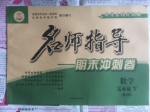题目内容
1. How long has it been since ?(hear)
从你上次接到你女儿的信以来有多长时间了?
1. you heard from your daughter

练习册系列答案
 名师指导期末冲刺卷系列答案
名师指导期末冲刺卷系列答案
相关题目
题目内容
1. How long has it been since ?(hear)
从你上次接到你女儿的信以来有多长时间了?
1. you heard from your daughter

 名师指导期末冲刺卷系列答案
名师指导期末冲刺卷系列答案